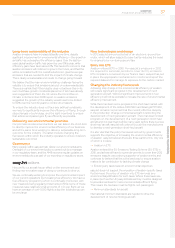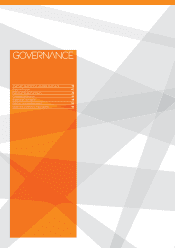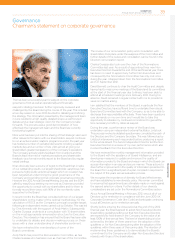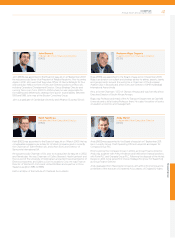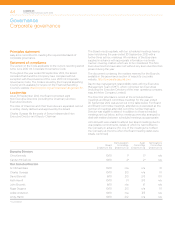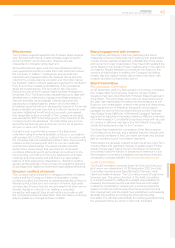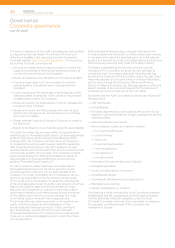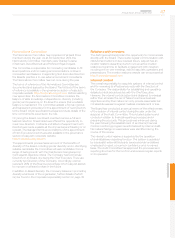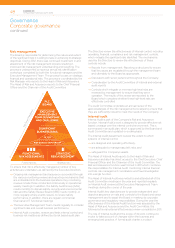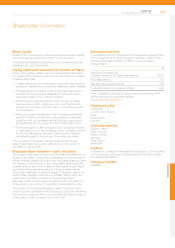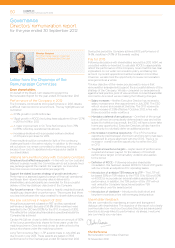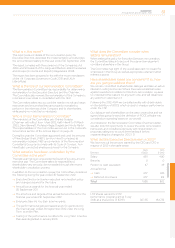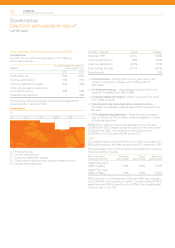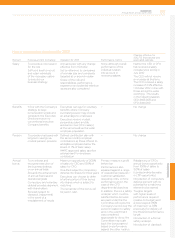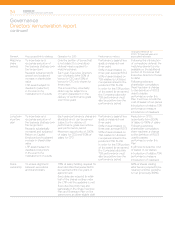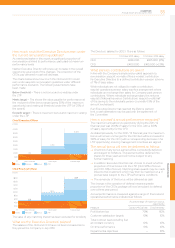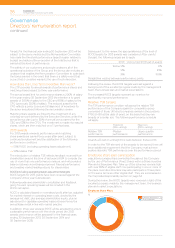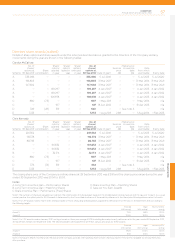EasyJet 2012 Annual Report Download - page 49
Download and view the complete annual report
Please find page 49 of the 2012 EasyJet annual report below. You can navigate through the pages in the report by either clicking on the pages listed below, or by using the keyword search tool below to find specific information within the annual report.
Nominations Committee
The Nominations Committee has comprised of at least three
members during the year. As at 30 September 2012, the
Nominations Committee members were Charles Gurassa
(Chairman), David Bennett and Professor Rigas Doganis.
This Committee is responsible for nominating candidates to fill
Board positions and for making recommendations on Board
composition and balance. In appointing Non Executive Directors,
the Board’s practice is to use external recruitment consultants.
The Nominations Committee has met once during the year.
The terms of reference of the Nominations Committee are
documented and agreed by the Board. The full text of the terms
of reference is available in the governance section of easyJet’s
corporate website, http://corporate.easyJet.com. Before selecting
new appointees, the Nominations Committee considers the
balance of skills, knowledge, independence, diversity (including
gender) and experience on the Board to ensure that a suitable
balance is maintained. The Committee adopts a formal, rigorous
and transparent procedure for the appointment of new Directors
to the Board. All job specifications prepared include details of the
time commitments expected in the role.
On joining the Board, new Board members receive a full and
tailored induction. Shareholders are offered the opportunity to
meet new Directors. Contracts and letters of appointment with
Directors are made available at the Annual General Meeting or on
request. The standard terms and conditions of the appointment
of Non Executive Directors are also available in the governance
section of easyJet’s corporate website,
http://corporate.easyJet.com.
The appointments process takes account of the benefits of
diversity of the Board, including gender diversity, and in identifying
suitable candidates the Committee will seek candidates from a
range of backgrounds, with the final decision being based on
merit against objective criteria. The Company has two female
Directors on its Board, one being the Chief Executive. There are
currently ten Directors of the Company. Accordingly, women
represent 20% of the Board, a percentage which easyJet aspires
to improve or at least to retain in the future.
In addition to Board diversity, the Company believes in promoting
diversity at all levels of the organisation, further details of which
can be found in the Corporate responsibility section on page 35.
Relations with investors
The AGM gives all shareholders the opportunity to communicate
directly with the Board. There is also regular communication with
institutional investors on key business issues. easyJet has an
investor relations department which runs an active investor
relations programme to facilitate engagement with investors
including one on one meetings, visits to easyJet’s operations and
presentations. The investor relations website can be accessed at
http://corporate.easyjet.com.
Internal control
The overall responsibility for easyJet’s systems of internal control
and for reviewing its effectiveness rests with the Directors of
the Company. The responsibility for establishing and operating
detailed control procedures lies with the Chief Executive.
However, the internal control systems are designed to manage
rather than eliminate the risk of failure to achieve business
objectives and by their nature can only provide reasonable but
not absolute assurance against material misstatement or loss.
The Board has conducted an annual review of the effectiveness
of the system of internal control during the year under the
auspices of the Audit Committee. This included systems and
controls in relation to financial reporting processes and in
preparing the accounts. This process was enhanced during
the year following the establishment of an Internal Financial
Control monitoring programme administered by Internal Audit.
No material failings or weaknesses were identified during the
course of this review.
The internal control regime is supported by the operation
of a whistleblower reporting function. The system is operated
by a specialist external third-party service provider and allows
employees to report concerns in confidence on a no names
basis. The Audit Committee has approved the processes and
reporting structure for the function and receives regular reports
on its operation.
Governance
easyJet plc
Annual report and accounts 2012 47


